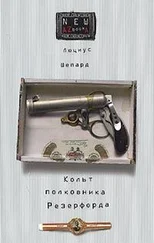Gilbey hopped down from the hatch that led to the computer deck behind the cockpit; he brushed imaginary dirt from his jeans and sauntered over to Mingolla and stood with hands on hips: a short muscular kid whose blond crewcut and petulant mouth gave him the look of a grumpy child. Baylor stuck his head out of the hatch and worriedly scanned the horizon. Then he, too, hopped down. He was tall and rawboned, a couple of years older than Mingolla, with lank black hair and pimply olive skin and features so sharp that they appeared to have been hatcheted into shape. He rested a hand on the side of the Sikorsky, but almost instantly, noticing that he was touching the flaming letter W in Whispering Death, he jerked the hand away as if he’d been scorched. Three days before there had been an all-out assault on the Ant Farm, and Baylor had not recovered from it. Neither had Mingolla. It was hard to tell whether or not Gilbey had been affected.
One of the Sikorsky’s pilots cracked the cockpit door. “Y’all can catch a ride into ‘Frisco at the PX,” he said, his voice muffled by the black bubble of his visor. The sun shined a white blaze on the visor, making it seem that the helmet contained night and a single star.
“Where’s the PX?” asked Gilbey.
The pilot said something too muffled to be understood.
“What?” said Gilbey.
Again the pilot’s response was muffled, and Gilbey became angry. “Take that damn thing off!” he said.
“This?” The pilot pointed to his visor. “What for?”
“So I can hear what the hell you sayin’.”
“You can hear now, can’tcha?”
“Okay,” said Gilbey, his voice tight. “Where’s the goddamn PX?”
The pilot’s reply was unintelligible; his faceless mask regarded Gilbey with inscrutable intent.
Gilbey balled up his fists. “Take that son of a bitch off!”
“Can’t do it, soldier,” said the second pilot, leaning over so that the two black bubbles were nearly side by side. “These here doobies”—he tapped his visor—“they got micro-circuits that beams shit into our eyes. Affects the optic nerve. Makes it so we can see the beaners even when they undercover. Longer we wear ’em, the better we see.”
Baylor laughed edgily, and Gilbey said, “Bull!” Mingolla naturally assumed that the pilots were putting Gilbey on, or else their reluctance to remove the helmets stemmed from a superstition, perhaps from a deluded belief that the visors actually did bestow special powers. But given a war in which combat drugs were issued and psychics predicted enemy movements, anything was possible, even micro-circuits that enhanced vision.
“You don’t wanna see us, nohow,” said the first pilot. “The beams mess up our faces. We’re deformed-lookin’ mothers.”
“’Course you might not notice the changes,” said the second pilot. “Lotsa people don’t. But if you did, it’d mess you up.”
Imagining the pilots’ deformities sent a sick chill mounting from Mingolla’s stomach. Gilbey, however, wasn’t buying it. “You think I’m stupid?” he shouted, his neck reddening.
“Naw,” said the first pilot. “We can see you ain’t stupid. We can see lotsa stuff other people can’t, ’cause of the beams.”
“All kindsa weird stuff,” chipped in the second pilot.
“Like souls.”
“Ghosts.”
“Even the future.”
“The future’s our best thing,” said the first pilot. “You guys wanna know what’s ahead, we’ll tell you.”
They nodded in unison, the blaze of sunlight sliding across both visors: two evil robots responding to the same program.
Gilbey lunged for the cockpit door. The first pilot slammed it shut, and Gilbey pounded on the plastic, screaming curses. The second pilot flipped a switch on the control console, and a moment later his amplified voice boomed out: “Make straight past that fork-lift ’til you hit the barracks. You’ll run right into the PX.”
It took both Mingolla and Baylor to drag Gilbey away from the Sikorsky, and he didn’t stop shouting until they drew near the fork-lift with its load of coffins: a giant’s treasure of enormous silver ingots. Then he grew silent and lowered his eyes. They wangled a ride with an MP corporal outside the PX, and as the jeep hummed across the cement, Mingolla glanced over at the Sikorsky that had transported them. The two pilots had spread a canvas on the ground, had stripped to shorts and were sunning themselves. But they had not removed their helmets. The weird juxtaposition of tanned bodies and shiny black heads disturbed Mingolla, reminding him of an old movie in which a guy had gone through a matter transmitter along with a fly and had ended up with the fly’s head on his shoulders. Maybe, he thought, the helmets were like that, impossible to remove. Maybe the war had gotten that strange. The MP corporal noticed him watching the pilots and let out a barking laugh. “Those guys,” he said, with the flat emphatic tone of a man who knew whereof he spoke, “are fuckin’ nuts!”
Six years before, San Francisco de Juticlan had been a scatter of thatched huts and concrete block structures deployed among palms and banana leaves on the east bank of the Rio Dulce, at the junction of the river and a gravel road that connected with the Pan American Highway; but it had since grown to occupy substantial sections of both banks, increased by dozens of bars and brothels: stucco cubes painted all the colors of the rainbow, with a fantastic bestiary of neon signs mounted atop their tin roofs. Dragons; unicorns; fiery birds; centaurs. The MP corporal told Mingolla that the signs were not advertisements but coded symbols of pride; for example, from the representation of a winged red tiger crouched amidst green lilies and blue crosses, you could deduce that the owner was wealthy, a member of a Catholic secret society, and ambivalent toward government policies. Old signs were constantly being dismantled, and larger, more ornate ones erected in their stead as testament to improved profits, and this warfare of light and image was appropriate to the time and place, because San Francisco de Juticlan was less a town than a symptom of war. Though by night the sky above it was radiant, at ground level it was mean and squalid. Pariah dogs foraged in piles of garbage, hardbitten whores spat from the windows, and according to the corporal, it was not unusual to stumble across a corpse, probably a victim of the gangs of abandoned children who lived in the fringes of the jungle. Narrow streets of tawny dirt cut between the bars, carpeted with a litter of flattened cans and feces and broken glass; refugees begged at every corner, displaying burns and bullet wounds. Many of the buildings had been thrown up with such haste that their walls were tilted, their roofs canted, and this made the shadows they cast appear exaggerated in their jaggedness, like shadows in the work of a psychotic artist, giving visual expression to a pervasive undercurrent of tension. Yet as Mingolla moved along, he felt at ease, almost happy. His mood was due in part to his hunch that it was going to be one hell of an r&r (he had learned to trust his hunches); but it mainly spoke to the fact that towns like this had become for him a kind of afterlife, a reward for having endured a harsh term of existence.
The corporal dropped them off at a drugstore, where Mingolla bought a box of stationery, and then they stopped for a drink at the Club Demonio: a tiny place whose whitewashed walls were shined to faint phosphorescence by the glare of purple light bulbs dangling from the ceiling like radioactive fruit. The club was packed with soldiers and whores, most sitting at tables around a dance floor not much bigger than a king-size mattress. Two couples were swaying to a ballad that welled from a jukebox encaged in chicken wire and two-by-fours; veils of cigarette smoke drifted with underwater slowness above their heads. Some of the soldiers were mauling their whores, and one whore was trying to steal the wallet of a soldier who was on the verge of passing out; her hand worked between his legs, encouraging him to thrust his hips forward, and when he did this, with her other hand she pried at the wallet stuck in the back pocket of his tight-fitting jeans. But all the action seemed listless, halfhearted, as if the dimness and syrupy music had thickened the air and were hampering movement. Mingolla took a seat at the bar. The bartender glanced at him inquiringly, his pupils becoming cored with purple reflections, and Mingolla said. “Beer.”
Читать дальше






